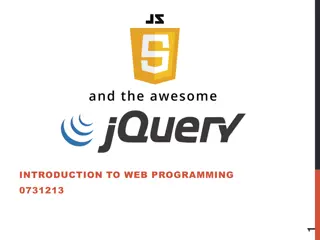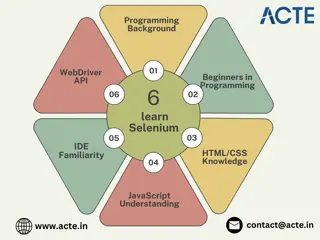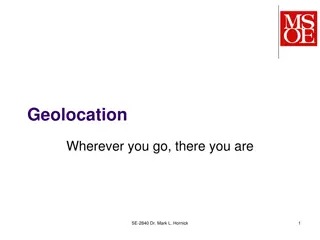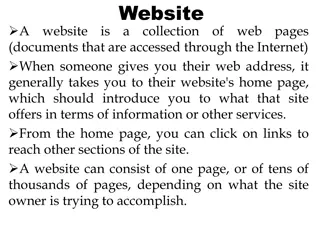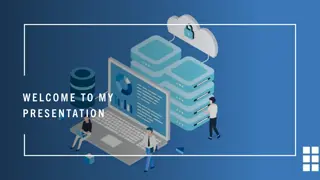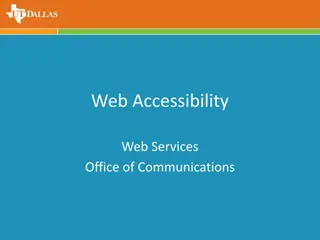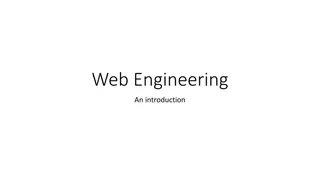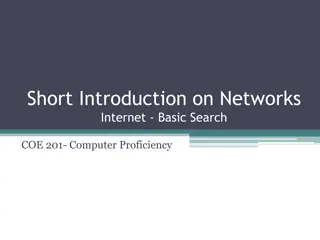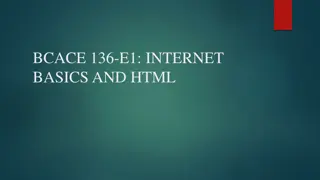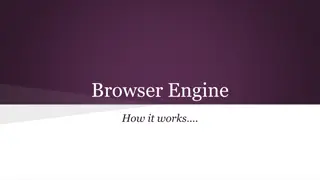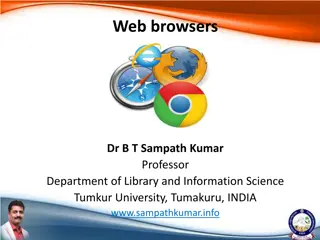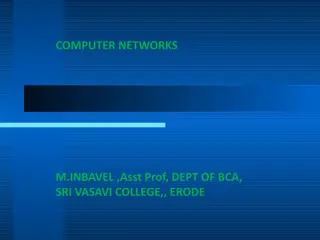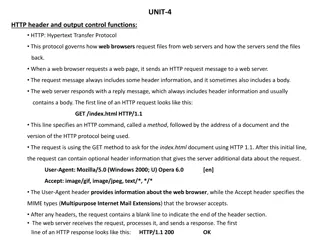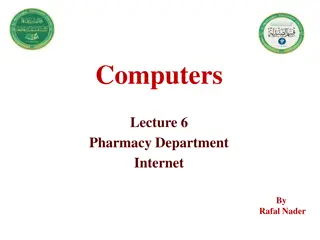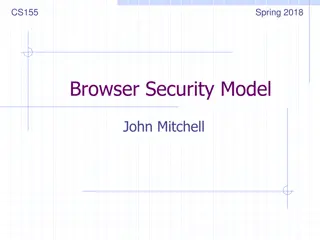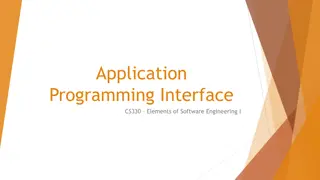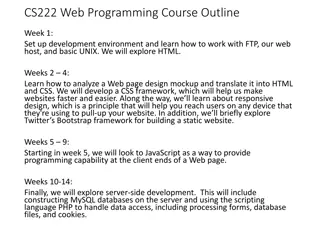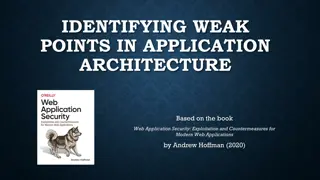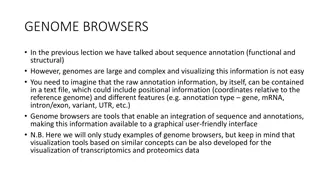Custom Web And Mobile Application Development
We build custom cloud-based applications that can work exactly in a cloud environment and interact with APIs and web browsers using various tools and techniques.
1 views • 2 slides
Understanding CSS in Amity School of Engineering & Technology
CSS, or Cascading Style Sheets, plays a crucial role in web development by specifying how documents are presented to users. This lecture series from Amity School of Engineering & Technology covers the basics of CSS, including its relationship with HTML, how browsers interpret CSS rules to style web
6 views • 39 slides
Introduction to Web Programming with JavaScript
Explore the world of web programming with JavaScript, a versatile language widely accepted by web browsers. Discover how JavaScript makes user interaction more engaging, efficient, and dynamic. Learn to manipulate HTML content, styles, and elements with JavaScript functions, and understand where to
0 views • 21 slides
How Easy and Quick Is It to Learn Selenium?
Learning Selenium, a powerful tool for automating web browsers, can be an exciting and rewarding journey, especially if you have a background in programming or web development. Embracing Selenium\u2019s capabilities becomes even more accessible and i
1 views • 1 slides
Understanding Internet Tools and Terminology
The Internet is a global network of interconnected computers utilizing the TCP/IP communication method. It includes the World Wide Web, browsers for accessing content, servers for data transfer, websites with webpages displayed via web servers, URLs for addressing resources, and protocols like SMTP,
1 views • 6 slides
Understanding the Basics of the World Wide Web
The session presented by Dr. Ebenezer Ankrah provides an overview of the World Wide Web, covering topics such as web terminology, URLs, browsers, and search engines. Through this session, students will gain a fundamental understanding of web-related concepts and tools. The reading list includes reco
0 views • 36 slides
Understanding the Importance of Web Cryptography API and Its Application
The Web Cryptography API is a vital tool that enables end-to-end encryption and authentication in browsers. This API allows secure handling of cryptographic algorithms, providing access to native crypto libraries. While JavaScript is faster, the native code is more secure and battle-tested, making i
0 views • 111 slides
Understanding Geolocation: What You Need to Know
Geolocation is a built-in browser functionality that allows web applications to be location-aware. It uses geographic latitude/longitude and is supported by all modern browsers, making it an integral part of the HTML5/W3C JavaScript API. With geolocation, you can show users their position on a map,
0 views • 16 slides
Understanding Internet Basics and Web Browsers
This content covers the basics of the Internet and World Wide Web, including the differences between the two, the functions of web browsers, components of Internet Explorer, parts of the World Wide Web, conducting effective Internet searches, understanding search results, evaluating websites, and di
0 views • 49 slides
Understanding Websites and Web Pages
Websites are collections of web pages accessed through the Internet, each with a unique web address. Users visit websites to find information they need or to complete tasks. Web pages are digital documents accessible via browsers, containing text, graphics, and multimedia elements. They serve variou
0 views • 8 slides
Understanding Web Hosting and Server Types
Web hosting is a service that enables individuals and organizations to make their websites accessible via the World Wide Web. It provides necessary infrastructure, storage, and connectivity to ensure websites are available to users 24/7. The web hosting process involves domain names, DNS translation
0 views • 9 slides
Understanding Web Technologies and Internet Standards
Web technologies encompass various tools and techniques used for communication between devices over the internet. It includes web browsers, programming languages, databases, protocols, multimedia elements, and data formats. The World Wide Web (WWW) plays a pivotal role in connecting networks globall
3 views • 35 slides
Understanding Web Accessibility and Its Importance
Web accessibility ensures that websites are designed to be inclusive and accessible to all users, regardless of their abilities. By removing barriers, web accessibility allows equal access to information and functionality, benefiting not only users but also businesses. Accessibility is vital in vari
0 views • 10 slides
Exploring the Fundamentals of Web Engineering
Delve into the world of web engineering with an introduction to its motivation, basic paradigms, conceptual architecture, history, protocol stack, the role of the World Wide Web Consortium (W3C), and the nature of web applications. Understand the categories of web applications and how they provide s
0 views • 51 slides
Introduction to Internet Basics and Web Browsing
Exploring the fundamental concepts of networks and the internet, this overview covers key elements like IP addresses, DNS, protocols, web browsers, and more. Understanding these basics is essential for navigating the online world effectively.
0 views • 24 slides
Understanding Memory Management Tradeoffs in Web Browsers
Explore the tradeoffs between memory usage, CPU cost, and performance in web browsers. Learn about setting heap limits, Pareto optimality, and compositional heap limit rules to optimize memory usage efficiently.
1 views • 18 slides
Understanding Web Security: Cross-Origin Resource Sharing & Same-Origin Policy
Exploring the concepts of Cross-Origin Resource Sharing (CORS) and Same-Origin Policy (SOP) in web security, including their implications on data sharing between different origins and how browsers enforce security restrictions to prevent unauthorized access.
0 views • 22 slides
Understanding Web Browsers and Internet Explorer
Web browsers are essential software applications that allow users to navigate the internet by interpreting HTML files, handling multimedia content, managing history, and more. Learn about the features of web browsers, their support for web standards like HTML and JavaScript, and how to open Internet
0 views • 17 slides
Understanding How Browser Engines Work
Browser engines play a crucial role in how web browsers retrieve, present, and traverse information resources on the World Wide Web. This process involves fetching a page, interpreting URLs, rendering content with layout engines, and utilizing components like the host application. Popular layout eng
0 views • 10 slides
Understanding Web Browsers: Features and Functions
Web browsers are essential software applications used for accessing and navigating information resources on the internet. They enable users to visit websites, search for specific content, and perform various tasks such as tabbed browsing, bookmarking, and refreshing pages. Different web browsers lik
0 views • 20 slides
Understanding Silverlight for Web Hosting Companies
Silverlight is a versatile web technology that provides cross-browser and cross-platform capabilities for creating rich internet applications. It allows for XML-based graphics, animation, audio, video, and event handling, scripted with JavaScript. Integration with web servers via AJAX design pattern
0 views • 16 slides
Understanding Computer Networks and the Internet: An Overview
Explore the world of computer networks, delve into the history of the internet, learn how to connect to the internet, discover internet services, and understand the significance of the World Wide Web. Gain insights into different types of web browsers and browsers. A comprehensive introduction to th
0 views • 9 slides
Unveiling the Wonders of the Internet
The Internet, the world's largest computer network, revolutionizes communication and information access through services like the World Wide Web. Its global reach facilitates rapid sharing of content and interaction, blurring the lines between users and creators. However, this openness also poses ch
0 views • 28 slides
Exploring HTML and CSS Fundamentals for Web Design
Delve into the essential concepts of HTML, XHTML, and CSS in the context of creating web pages. Learn about the Internet's history, the role of web browsers, and the significance of hypertext and markup languages. Enhance your skills by studying image files, HTML tags, formatting techniques, and mor
0 views • 32 slides
Overview of HTTP Protocol and Output Control Functions
The Hypertext Transfer Protocol (HTTP) governs how web browsers request files from servers and receive responses. When a browser requests a web page, it sends an HTTP request message to the server, which includes headers and optional body content. The server responds with a message containing header
1 views • 8 slides
Understanding the Basics of the Internet and World Wide Web
The internet, a vast network of networks, connects billions of users globally. Learn how the internet operates, who owns it, and the distinction between the internet and the World Wide Web. Discover the origins of the WWW and how web pages function to deliver information through browsers. Explore th
0 views • 29 slides
Evolution of the Internet: A Visual Journey Through Web Technologies
Explore the rich history of the internet through key technologies such as HyperText System, Gopher, Lynx, Mosaic, Netscape, Web Servers, Client-Server model, Web Hosting, Domain Name Registration, DNS Records, HTML, Firewall, HTML5 & JavaScript, and more. From early browsers to modern coding languag
0 views • 34 slides
Mastering Internet Research for Managers: Browser Tools and Search Techniques
Enhance your managerial skills by delving into Internet research techniques, focusing on web browser basics, search strategies, and browser tools. Learn about popular browsers like Google Chrome, Mozilla Firefox, Apple Safari, and Microsoft Edge, along with tips for efficient web searching using Chr
0 views • 13 slides
An Empirical Evaluation of Security Indicators in Mobile Web Browsers
Security indicators play a crucial role in determining the security of web pages on mobile browsers. This study evaluates the effectiveness of security indicators in identifying potential threats such as phishing and man-in-the-middle attacks. The research examines W3C guidelines, mobile browser com
0 views • 25 slides
Troubleshooting Web Sites with Web Browsers
Explore troubleshooting web sites with web browsers in the context of LIR HEAnet User Group for Libraries. This workshop covers topics such as CSS & JS updates, monitoring routes, user access rates, and more to equip libraries with essential web skills for optimizing electronic resources.
0 views • 22 slides
Understanding HTTP Security Headers for Web Apps
Explore the importance of HTTP security headers on web applications through a detailed breakdown of headers like HSTS, XFO, XSS, CSP, CTO, RH, and FP. Learn how these headers enhance security by instructing browsers on handling website content, preventing various attacks. Gain insights on configurin
0 views • 68 slides
Basic Web Security Model for Secure Electronic Commerce
This presentation covers the basic web security model for secure electronic commerce, focusing on vulnerabilities such as XSS and SQL injection. It discusses the decline in web vulnerabilities since 2009 and explores reported web vulnerabilities. The course theme includes topics like web application
0 views • 38 slides
Understanding Web Security: Threats and Protections
Exploring the landscape of web security through discussions on historical vulnerabilities, top web threats, browser security models, and the goals of web security. Delve into the world of web programming, security threat models, and learn about the goals and importance of maintaining a secure web br
0 views • 74 slides
Understanding APIs in Software Engineering
APIs (Application Programming Interfaces) serve as messengers between software components, enabling interaction and data exchange. They come in various types, like Web APIs and RESTful APIs, facilitating controlled information presentation. JSON (JavaScript Object Notation) is a common data format,
0 views • 15 slides
Ultimate Guide to Own Web Now's Web Hosting Platform
Dive into Own Web Now's web hosting platform through this comprehensive startup guide, which covers the process of ordering website hosting, deployment, management, and publishing website content. Learn about the Linux/PHP and Windows ASP.NET hosting options, how to configure your hosting account, m
0 views • 7 slides
Introduction to Web Development and Tools for Success
Explore the fundamentals of web programming with a focus on setting up the development environment, working with HTML, CSS, JavaScript, and server-side technologies. Learn how to analyze web page mockups, implement responsive design principles, and leverage tools like FTP, web hosting services, and
0 views • 22 slides
Understanding the Architecture of the World Wide Web
The World Wide Web (WWW) is a vast repository of information accessible through a distributed client-server system. Users interact with web pages hosted on servers through browsers, utilizing URLs to navigate between different sites. This system consists of clients (browsers) and servers, where clie
0 views • 44 slides
Exploring Privacy on the Web: Understanding the Deep and Dark Web
Delve into the intricate world of internet privacy, from the surface web to the hidden realms of the deep and dark web. Discover the importance of safeguarding personal data online, the significance of the Deep Web's unindexed content, and the intricacies of the Dark Web accessible via specific soft
0 views • 25 slides
Understanding Weak Points in Web Application Architecture
Information collected during the reconnaissance process can unveil critical aspects of a web application's architecture, including technologies used, API endpoints, functionality, domains, configurations, and authentication systems. Vulnerabilities in web applications often stem from poorly designed
4 views • 13 slides
Understanding Genome Browsers and their Significance in Genomic Research
Genome browsers are essential tools for visualizing complex genome information, integrating sequence data with annotations in a user-friendly graphical interface. They enable exploration of chromosomal regions, regulatory elements, and comparative genomics across different organisms. Key examples in
0 views • 24 slides


